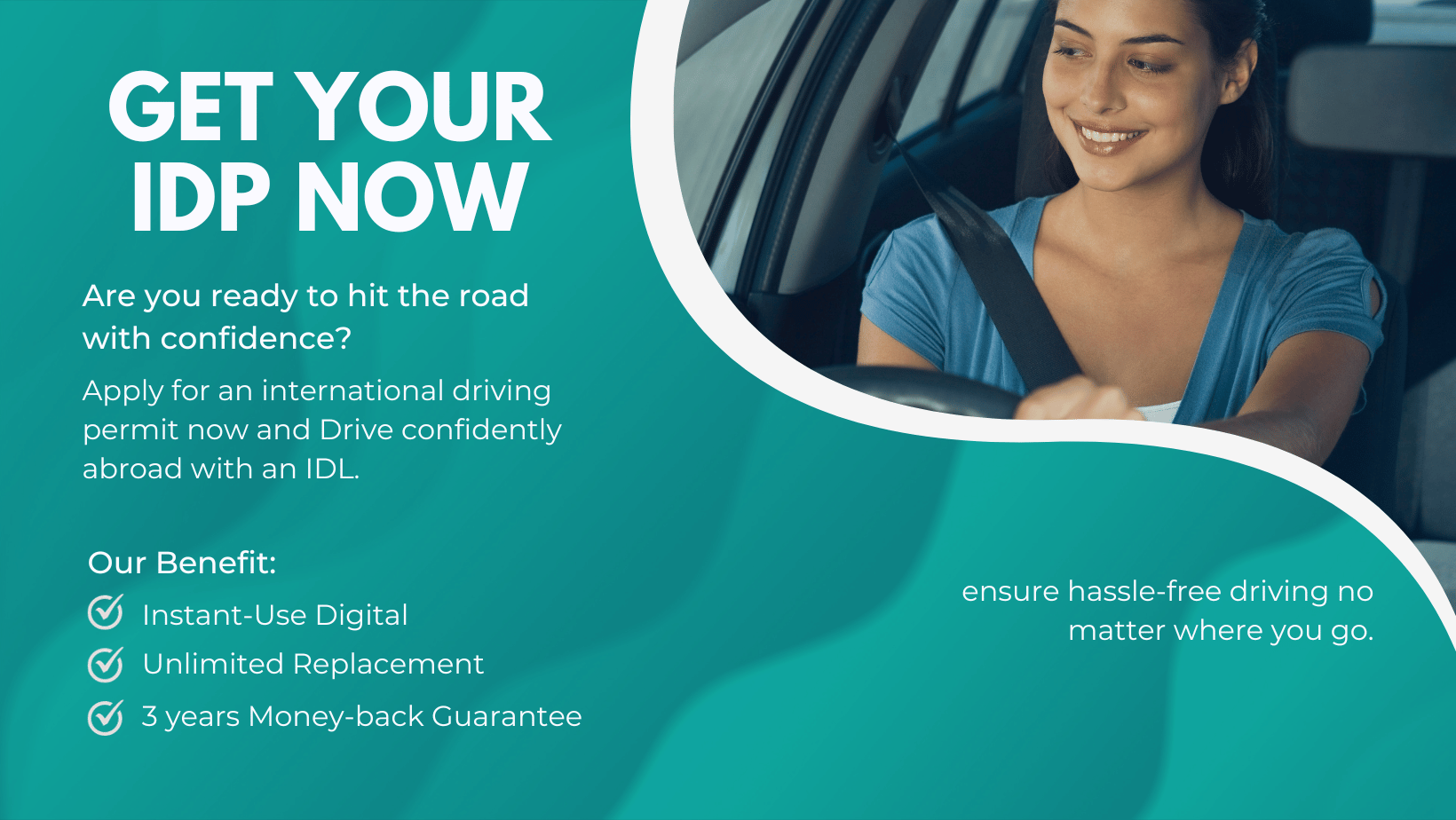
Anytime, anywhere, if you need a replacement IDP, we’ve got you covered.
Our IDP is your gateway to freedom on the roads in over 190 countries.
Explore with confidence; your UN- standardized document is globally accepted.
Our expert support team is available 24/7 via live chat to help you drive confidently.

International Driving Permit (IDP), regulated by the United Nations, certifies that you are the holder of a valid driver's license in your country of origin.
Your IDP is a valid form of identification in more than 150 countries worldwide and contains your name, photo and driver information in the 12 most widely spoken languages in the world.

International Driving Permit (IDP), regulated by the United Nations, certifies that you are the holder of a valid driver's license in your country of origin.
Your IDP is a valid form of identification in more than 150 countries worldwide and contains your name, photo and driver information in the 12 most widely spoken languages in the world.
Have your driver’s license and delivery
address handy
Upload pictures of your driver's license
Wait for confirmation and you’re ready to go!
Driving Regulations in Guinea
Guinea, renowned for its extraordinary natural resources, beckons nature enthusiasts to explore its vast expanse. Considering the country's size, opting for personal vehicle travel stands as the optimal way to traverse its diverse landscapes. However, it's crucial to heed these guidelines before embarking on your journey.
Key Guidelines:
1. Right-hand driving is practiced in Guinea.
2. The minimum legal driving age is 18, while the minimum rental age is 23.
3. Seat belts are mandatory.
4. Utilize hands-free devices; mobile usage while driving is allowed only with hands-free technology.
5. Adhere to responsible drinking habits; the legal alcohol limit is 80 mg per 100 ml of blood.
6. Urban areas enforce a speed limit of 60 km/h.
7. Due to poor road conditions, maintain vigilant focus while driving.
8. Exercise caution at checkpoints, which are occasionally set up by local police for potential bribery.
9. Possession of third-party insurance is compulsory.
10. It's advisable to avoid driving at night.
Driving During the Rainy Season
Given Guinea's location in Africa, it doesn't experience a winter season. Traveling during the rainy period (July to September) is discouraged. Ensure your emergency kits are readily accessible throughout your journey. Strategically plan your trip for an optimal vacation experience.
Embrace your stay and embark on safe travels.
Nestled along the Atlantic coast of Africa, Guinea boasts numerous captivating destinations worth exploring. Merely 30 minutes off the capital's coast lies Iles de Los, a cluster of islands boasting expansive sandy beaches reminiscent of Hawaii's Pacific charm. However, Guinea offers more than just beaches; it promises unique cultural experiences and nature reserves, establishing itself as an underrated global gem.
Top Attractions in Guinea
If Guinea entices you to include it in your African itinerary, acquire your International Driving Permit for Guinea and discover some of its celebrated destinations!
National Park of Upper Niger
The Parc National du Haut Niger entices wildlife enthusiasts. Spanning the Niger River, this park hosts a diverse array of mammals, amphibians, and birds. To witness creatures like the West African Manatee, Lions, and Hippopotamuses in their natural habitat, equip yourself with binoculars and book a tour to this captivating park.
Fouta Djallon Highlands
Fouta Djallon serves as a vital region in Guinea's economy, boasting multiple waterfalls and springs that nourish various rivers across West Africa. Embark on exhilarating hikes amid plateaus and waterfalls, capturing these breathtaking landscapes through your lens.
Cape Verga
For those unable to visit Iles de Los, a three-and-a-half-hour drive north of Conakry leads to Cape Verga, featuring renowned beaches like Bel-Air. Engage in surfing, paragliding, or simply unwind amidst swaying palm trees. Locals can guide you to Bel-Air Beach, considering the area's vastness.
Labe
Labe, the Fulani People's commercial hub, offers fresh citrus fruits and diverse local cuisine. Nightclubs and cafes cater to those seeking relaxation after exploring Fouta Djallon's rugged terrain.
Kindia
Explore agricultural practices in Africa by visiting Kindia. This region showcases expansive agricultural gardens and research centers focusing on Guinea's agricultural potential, offering insights into successful produce growth in diverse climates.
Boke
Boke, hosting Guinea's second busiest port, holds historical significance as a former principal port for the country's slave trade. Today, the Fortin de Boke Museum narrates poignant stories of this chapter in Guinea's history.
Conakry
Guinea's capital city, Conakry, offers a vibrant cultural scene. Explore renowned spots like Faga Faga Fougou Espace Culturel, Centre de’Art Acrobatique Keita Fodeba, and architectural marvels like St. Mary’s Cathedral and the Grand Mosquee. Note that conservative cultural norms discourage photography of locals and government buildings without prior permission.
Mount Nimba
As the highest peak in West Africa, Mount Nimba offers motor vehicle access to its UNESCO World Heritage Site trails. Engage a local tour guide for a safe exploration of its diverse wildlife and stunning landscapes.
Vital Road Regulations
With an array of thrilling destinations awaiting exploration in Guinea, familiarizing yourself with the country's road rules is imperative for a secure and enjoyable journey. Despite criticisms regarding enforcement, adherence to these rules ensures personal safety.
1. Valid driving documentation, including an international permit, is mandatory.
2. Drive on the right side of the road.
3. Observe speed limits, although some areas lack signage.
4. Refrain from driving under the influence, with a maximum allowable alcohol concentration of 80mg per 100ml of blood.
Your knowledge of these rules ensures a smoother and safer road trip experience throughout Guinea.